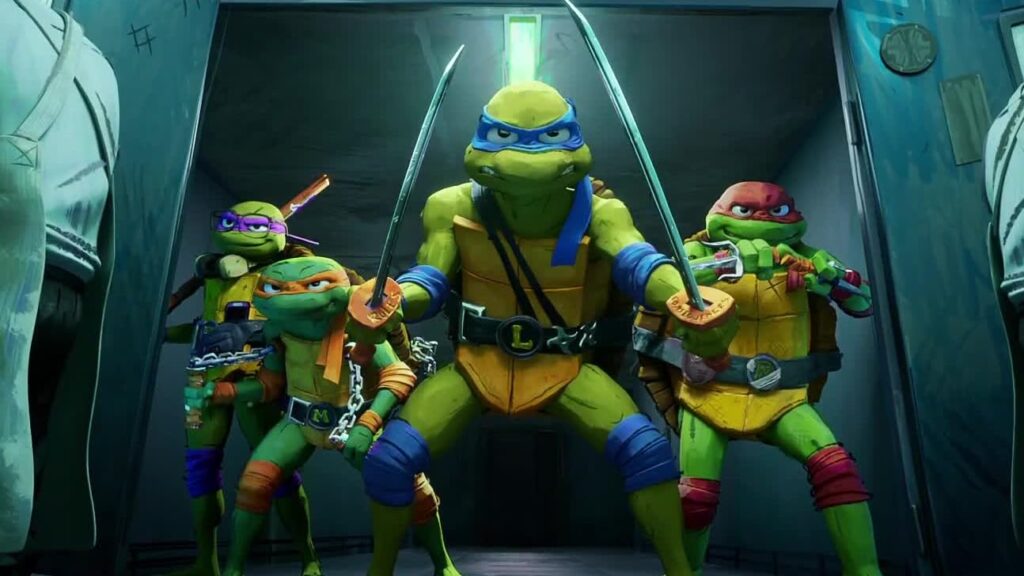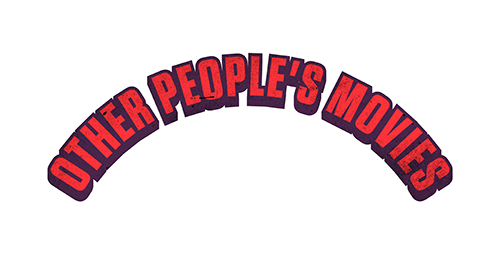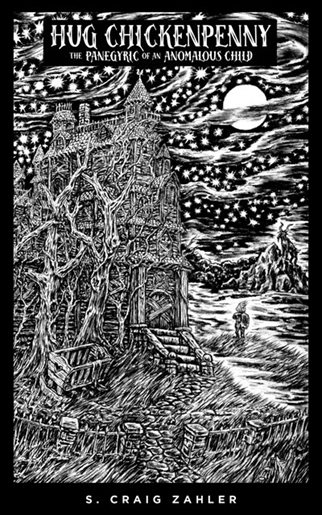
This latest of many feature-film adaptations of the Teenage Mutant Ninja Turtles comic book series that was created by Kevin Eastman and Peter Laird in the mid-80s offers a new take on the long-beloved characters and their universe. Animated in a comic-book-in-action-meets-stop-motion style, the film is nothing short of a delight at which to look. Tonally, however, it is a sometimes-confused jumble that doesn’t always seem to know the exact audience at which it is aiming.
Teenage Mutant Ninja Turtles: Mutant Mayhem shows us how, after exposure to a green ooze that is part of a secret government experiment, the four title characters (Donatello, Michelangelo, Leonardo, and Raphael) are transformed from baby, sewer-dwelling turtles into upright-walking, English-speaking, and martial arts-practicing individuals with a teenage mindset. The turtles are fathered by an also-transformed rat by the name of Splinter (amusingly voiced by the one-and-only Jackie Chan), who raises them with civility, a deep appreciation for pizza, and an overwhelming fear of the human population that lives above their underground habitat.
The turtles’ story goes into motion when they are introduced to the classic character of April O’Neil (voiced by Ayo Edebiri). In this incarnation, April is a nerve-wracked, weak-stomached high school reporter who befriends the turtles without prejudice and teaches them that all humans aren’t quite as bad as they may seem. The turtles then go on to find and befriend other mutants like Superfly (voiced by Ice Cube), Rocksteady (voiced by John Cena), Bebop (voiced by Seth Rogen), Leatherhead (voiced by Rose Byrne), and Mondo Gecko (voiced by Paul Rudd). Some of these new friends, however, turn out to be an extreme threat to the human population, and the turtles are forced to choose between defending the species they were raised to despise and staying loyal to other creatures of similar origin.
The general storyline of Teenage Mutant Ninja Turtles: Mutant Mayhem is a great fit for children and young teenagers. It’s a fun, inventive, and highly amusing tale that also teaches the importance of accepting those with notable differences from ourselves. Confusingly, however, the film simply doesn’t always feel like a kids’ movie, and it is often littered with tonal inconsistencies and moments that are simply too adult-oriented in their design and execution.
The screenplay, written by Seth Rogen, Evan Goldberg, Jeff Rowe, Dan Hernandez, and Benji Samit, is torn between a Rogen/Goldberg Superbad-style edgy teenage comedy and a more conventional, family-friendly, and action-driven superhero film. The conflicting styles only occasionally meld successfully, and the final result is, at its worst, a bit of a tonal mess. Rogen and Goldberg’s sense of humor isn’t always appropriate for the audience for which Teenage Mutant Ninja Turtles: Mutant Mayhem seems to be playing. Their presumed contributions of gross-out humor and hip-hop coolness don’t always align with the film’s otherwise childlike sensibilities.
The film’s most notable tonal faults are largely due to its inconsistent background music. About half of the film is accompanied by a fun, laid-back, and R&B-heavy selection of pre-recorded pop songs. These songs are at complete odds with the industrial-laden musical score by Trent Reznor and Atticus Ross. Though the score is not bad in and of itself and has some occasional moments of ethereal beauty that fit select moments of wonder perfectly, it is predominantly much too intense and Nine Inch Nails-sounding for a film that is mostly geared towards younger audiences. Reznor and Ross have created wonderful, more fitting soundtracks in the past (Gone Girl, Mid90s, The Social Network), but their work on Teenage Mutant Ninja Turtles: Mutant Mayhem is rather out of place and distracting.
Teenage Mutant Ninja Turtles: Mutant Mayhem is an overall entertaining film that has as much going for it as it does against it. Despite its tonal confusion, it displays a creative and wowing animation style that highlights the rambunctious attitude of its amusing and endearing title characters. Its screenplay and final edit could have used a bit more consistency, thought, and finessing, but its ultimate impact is enjoyable and light-hearted enough to make its sometimes sloppy execution somewhat forgivable.
GRADE: B-



